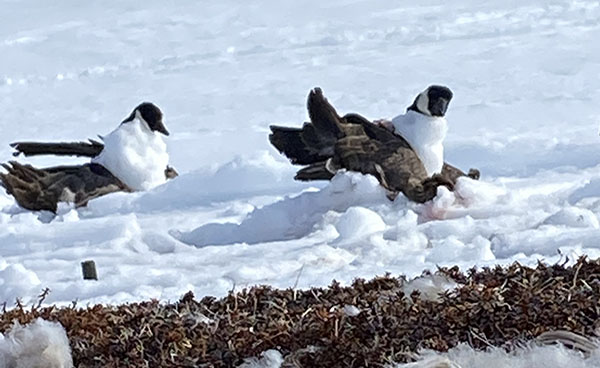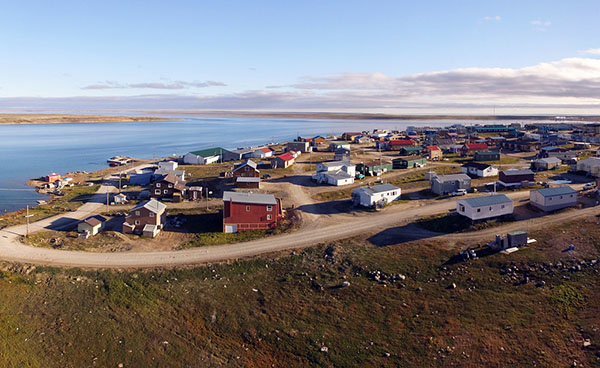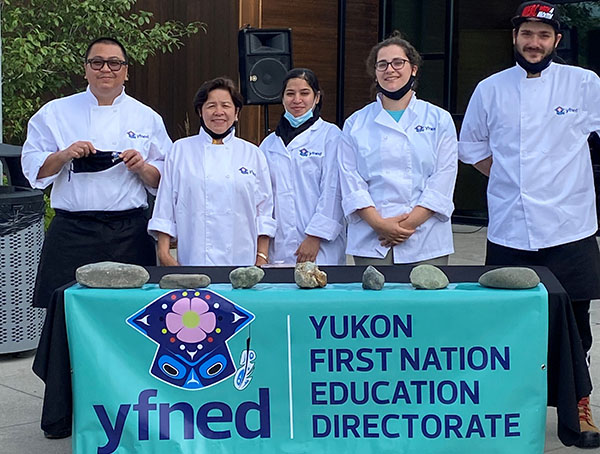Northern Food Innovation Challenge Phase 1 Participants
For Phase 1, nine applicants were selected to refine and test their ideas as a "proof of concept". Up to three successful participants from Phase 1 of the Challenge will be invited to scale up their projects while supported with Phase 2 funding of up to 1 million dollars per project. The finalists for Phase 2 will be announced in 2023.
Here are the nine applicants that were selected to participate in Phase 1.
On this page
Nunavut

Project Name: Kanuq Goose Product Development – Inuit food Sovereignty in Arviat
Location: Arviat
Participant: Aqqiumavvik Society
The Aqqiumavvik Society uses research to build evidence for strong programming. The Society addresses community-generated concerns by posing research questions that allows them to seek useful solutions to improve their own situation. Projects cover a wide range of wellness areas and target issues that are environmental, social, family, community, and health related. Often working together with other local organizations, and always with the direction of Elders and community, the programming run through Aqqiumavvik is continually developing and adapting to the needs and realities of Arviat.
Project: The project will allow the Aqqiumavvik Society to assess the health of the local Arviat goose population, create and test new goose products to grow the local economy, and educate the public on the health benefits of goose consumption. It will also build capacity in the community by involving youth in the harvesting, monitoring, and processing, while the society will develop recipes and educational materials that will be used to educate community members on how to prepare meals made of goose.

Project Name: Kitikmeot Inuit Food System Programs and Knowledge Hub
Location: Cambridge Bay
Participant: The Hamlet of Cambridge Bay
The Hamlet of Cambridge Bay is the administrative, business, and transportation centre of the Kitikmeot Region. The Hamlet delivers services to approximately 2,000 people living within the 202 km2 municipal boundary. The Mayor, council, and municipal staff provide administration, recreation, wellness, planning and land development, municipal works, and finance services. The Hamlet employs approximately 40 full-time and 12 part-time employees.
Project: The Hamlet will develop educational and training programs (curriculum, workshops, illustrated images, videos) linked to protocols for growing crops in the North, butchering country food, and promoting nutritional health in the Kitikmeot region. The Hamlet will engage with local groups, as well as Laval University and Carleton University, to ensure traditional knowledge is adequately considered in addressing food security issues. The project is expected to lead to the development of a knowledge hub for the implementation of food programs rooted in Inuit traditions while leveraging clean technologies and academic research.

Project Name: Ilisaqsivik Society - Strengthening Food Harvesting Capacity
Location: Clyde River
Participant: Ilisaqsivik Society
Ilisaqsivik Society is a community-based non-profit organization dedicated to advancing health and wellness, capacity building, and Inuit-centred economy in Clyde River, Nunavut. For nearly 25 years, Ilisaqsivik has been providing Inuit-led, culturally and linguistically relevant programs founded on Inuit knowledge. Programs are wide-ranging, delivered in Inuktitut and often unprecedented. Ittaq Heritage and Research Centre is part of Ilisaqsivik. Ittaq supports Inuit self-determination in research and specializes in land-programming and multimedia. Angunasuktiit, one of Ittaq’s core programs, aims to strengthen food security and food sovereignty, pass on Inuit knowledge, and show the critical place of hunting in community economy.
Project: The Society will employ hunter-instructors to provide traditional country food year-round to elders, children, families, and other community members. This project will also involve hiring instructors able to teach youth the skills needed to hunt and harvest traditional country food. This project is designed around the creation of an innovative Inuit-centred local food economy that is intended to build capacity and help provide country food to the community on a daily basis.

Project Name: Inuliqtait Country Food Program
Location: Iqaluit
Participant: Qajuqturvik Community Food Centre (QCFC)
Qajuqturvik Community Food Centre strives to strengthen health, belonging and food sovereignty in Iqaluit by utilizing the power of food, tradition and community. QCFC offers a range of programming that focuses on food access, food skills, and advocacy work to address the many root causes of food insecurity.
Project: The Inuliqtait Country Food Program will provide the opportunity for harvesters to make a living by harvesting country food, provide storage and food processing capacity, foster the development and expansion of healthy and sustainable products, and will also contribute to strengthening food security in the North. The program will also introduce a sliding scale pricing system that will ensure customers can purchase country food at an affordable price point that suits their means.

Project Name: Qikiqtani Food Sovereignty Implementation Solution
Location: Qikiqtani Region
Participant: Qikiqtaaluk Business Development Corporation (QBDC)
The Qikiqtaaluk Business Development Corporation was created to stimulate local and regional economic development opportunities. The organization works to build prosperous, more self-sufficient communities. They also cultivate strategic partnerships in order to build essential infrastructure, advance new and innovative solutions to enhance economic development, and leverage third-party investments to support communities in advancing their visions.
Project: This project will invest in community harvesting infrastructure such as storage and processing facilities. It will also test a model for supporting a professional harvesting industry by piloting a living wage for harvesters in the Qikiqtani Region. In addition, it will establish community-based infrastructure, such as cut and wrap food processing facilities, build capacity in harvesting and distribution, and directly support community harvesters.
Northwest Territories

Project Name: Food Security, Bison Farm to Fork
Location: Fort Simpson
Participant: Fort Simpson Métis Development Corporation (FSMDC)
The Fort Simpson Métis Development Corporation was incorporated in 1989 by members of the Fort Simpson Métis community, Métis Local 52. The primary goal of the Corporation is to develop and invest in businesses that benefit members of the Fort Simpson Métis Local 52 and the community.
Project: The Fort Simpson Métis Development Corporation will undertake a feasibility study on establishing a bison farm and meat processing facility in Fort Simpson, Northwest Territories. Funding will enable the FSMDC to complete regulatory research, community engagement, and hire project coordinators to conduct a feasibility study. This project will focus on culturally appropriate foods and will address food insecurity by producing dry meat and using innovative food processing approaches that will combine traditional and contemporary methods. No similar facility currently exists in the NWT. A successful feasibility study may also lead to a processing facility.

Project Name: Country Foods in Community Programming in Tuktoyaktuk and Paulatuk
Location: Inuvialuit Settlement Region
Participant: University of Waterloo
The project team is composed of the University of Waterloo, University of Ottawa, Université Laval, a key knowledge user at the Inuvialuit Regional Corporation, and several community partners in Tuktoyaktuk and Paulatuk in the Inuvialuit Settlement Region (ISR), NWT. Members of this team have been working with communities, organizations and partners in the ISR for several years. The University of Waterloo is a research-intensive university, known for its innovation, with a mandate to spur innovation into impact for the communities and organizations that the university and its researchers collaborate with.
Project: The project, led by the University of Waterloo, will carry out research and develop traditional food guidelines to ensure the culturally appropriate delivery of country foods into existing food systems in Tuktoyaktuk and Paulatuk, Northwest Territories. In collaboration with local schools, daycares and cooking circles, this includes activities such as acquiring equipment and supplies for harvesting country food, providing support for harvesters and food processing, supporting Elder-youth knowledge transfer, organizing community food workshops, and conducting engagement with communities.
Yukon

Project Name: Innovative Social Enterprise Business Models for Local Food in the North
Location: Carmacks
Participant: Little Salmon/Carmacks First Nation
The Little Salmon/Carmacks First Nation (LS/CFN) is one of the 14 First Nations in Yukon. LSCFN is a primary service provider for its citizens in the areas of governance, health and social service programs, education support programs, preschool programs, housing, community infrastructure, lands & resources management, and heritage stewardship.
Project: The Little Salmon / Carmacks First Nation will do research and develop business plans around the organization’s farm and greenhouse project. The LS/CFN greenhouse is designed to prioritize providing food at low or no cost to citizens and reduce relying on government and/or inconsistent funding. These business plans will be used to explore hybrid models including sales to regular commercial buyers, paying customers, and low-cost/no-cost distribution to specific priority groups within the community to ensure a more consistent source of funding for local community greenhouses.

Project Name: Centralized Traditional and Local Processing Kitchen Facility
Location: Whitehorse
Participant: Yukon First Nation Education Directorate
The Yukon First Nation Education Directorate is an indigenous-led organization dedicated to capacity-building, systems and resources development, second-level educational programs and services enhancement, and learner supports. YFNED advances First Nation decision-making and aspirations for control over education, providing technical support, research and advice for Framework Agreement processes, and advocates for First Nation student success across the system.
Project: The YFNED will complete a feasibility study, functional plan, conceptual layout and detailed design for a centralized traditional and local processing kitchen facility in Whitehorse, Yukon. YFNED will complete research and determine the design requirements that would allow an innovative traditional and local foods commercial kitchen that could support the processing and storage of wild game in an urban setting. Additionally, the project will see the development of a traditional knowledge curriculum that will enable knowledge sharing and training on First Nation food processing. This project will produce a curriculum and create an easily reproduced design of a fully certified First Nation food kitchen.